Momentum pulled off what every entrepreneur dreams of: Last year, it closed a lead investor for its seed round — which our own Ron Miller covered at the time — without even creating a pitch deck. A minor investor in its previous round had been keeping a close eye on the company, and when it mentioned it was raising a round, the investor swooped in and convinced Momentum it was the right choice to lead the round.
Once a lead was secured, Momentum created a pitch deck to fill out the round. I spoke with the company’s CEO to learn more about how it raised money without a deck, and he was gracious enough to let us share the deck that completed the rest of the round.
Momentum is a B2B company that creates sales process automation tools that make it easier to collaborate over Slack, which is especially helpful for organizations with complex sales processes with multiple stakeholders, decision-makers and handover points.
If you love these pitch deck teardowns and you want to submit your own, here are the details for how to do that!
Slides in this deck
Momentum’s seed deck contains 19 slides:
- 1 — Cover slide
- 2-4 — Problem slide in three parts
- 5-7 — Solution slide in three parts
- 8-10 — Product slide in three parts
- 11 — Market timing slide (“why now”)
- 12 — Traction slide
- 13 — User validation slide
- 14 — Market size slide
- 15 — Team and investor slide
- 16 — “The ask” slide
- 17 — Placeholder for demo
- 18 — “Mic drop” slide — customer testimonial
- 19 — Thank you slide
Three things to love
Momentum successfully raised a $5 million round with a beautiful and simple deck. It took the approach of breaking up some of the key slides (the problem, solution and product slides) into nine different slides. It really works in this particular deck, and it helps keep the flow of the pitch. It also makes the deck really easy to consume without the benefit of the company’s founder adding context to the story, which is fantastic.
Great “ask” slide
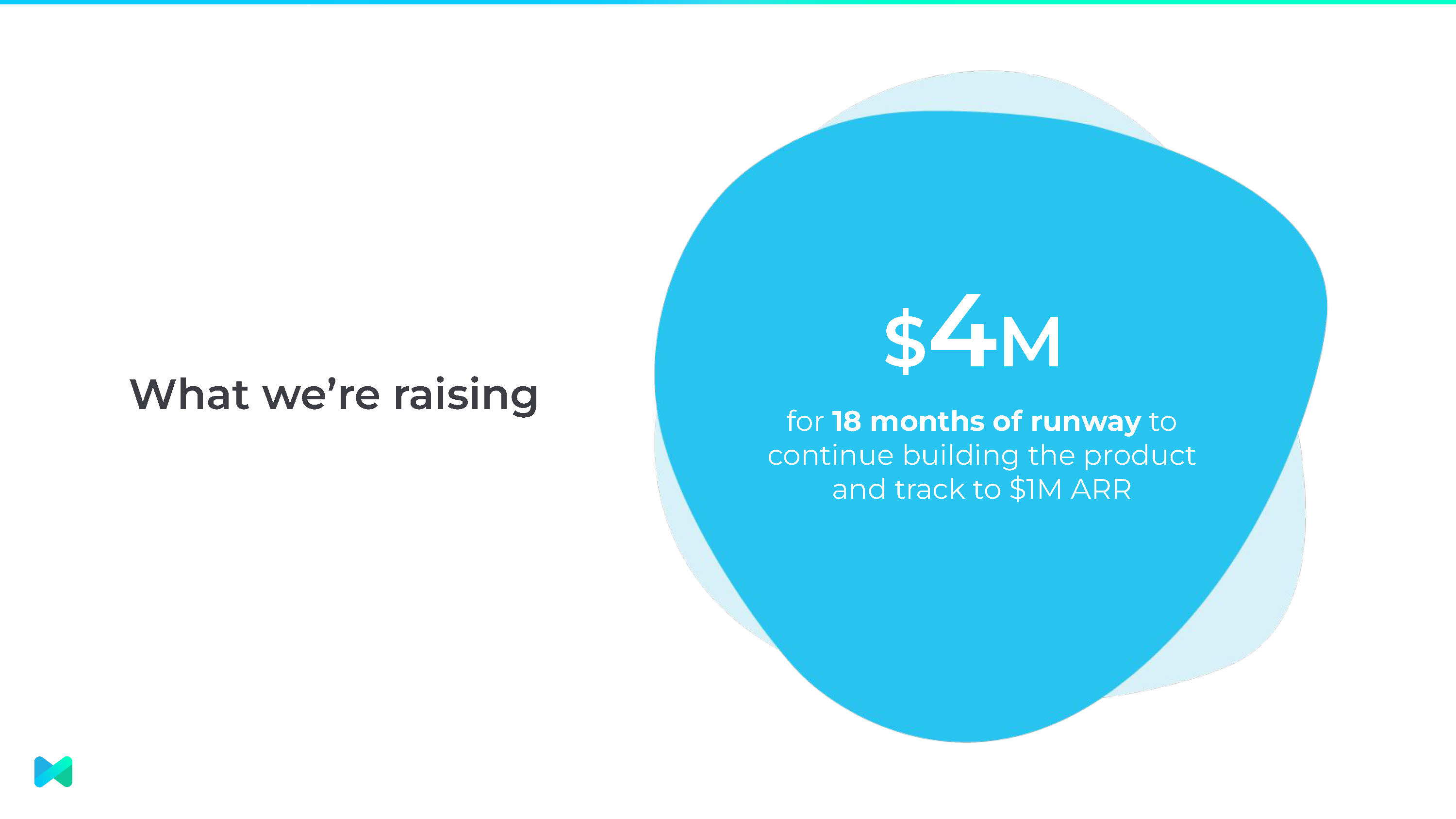
Whenever I work with startups, I implore them to include an “ask” slide, and while not a complete slam dunk (more about that in just a moment), Momentum’s is one of the best I have seen to date. I love the clarity: We are raising $4 million. That will give us 18 months of runway, and we will do these things with the money. It makes it really clear for investors to contextualize what the company is about to do.
Makes the pitch feel current
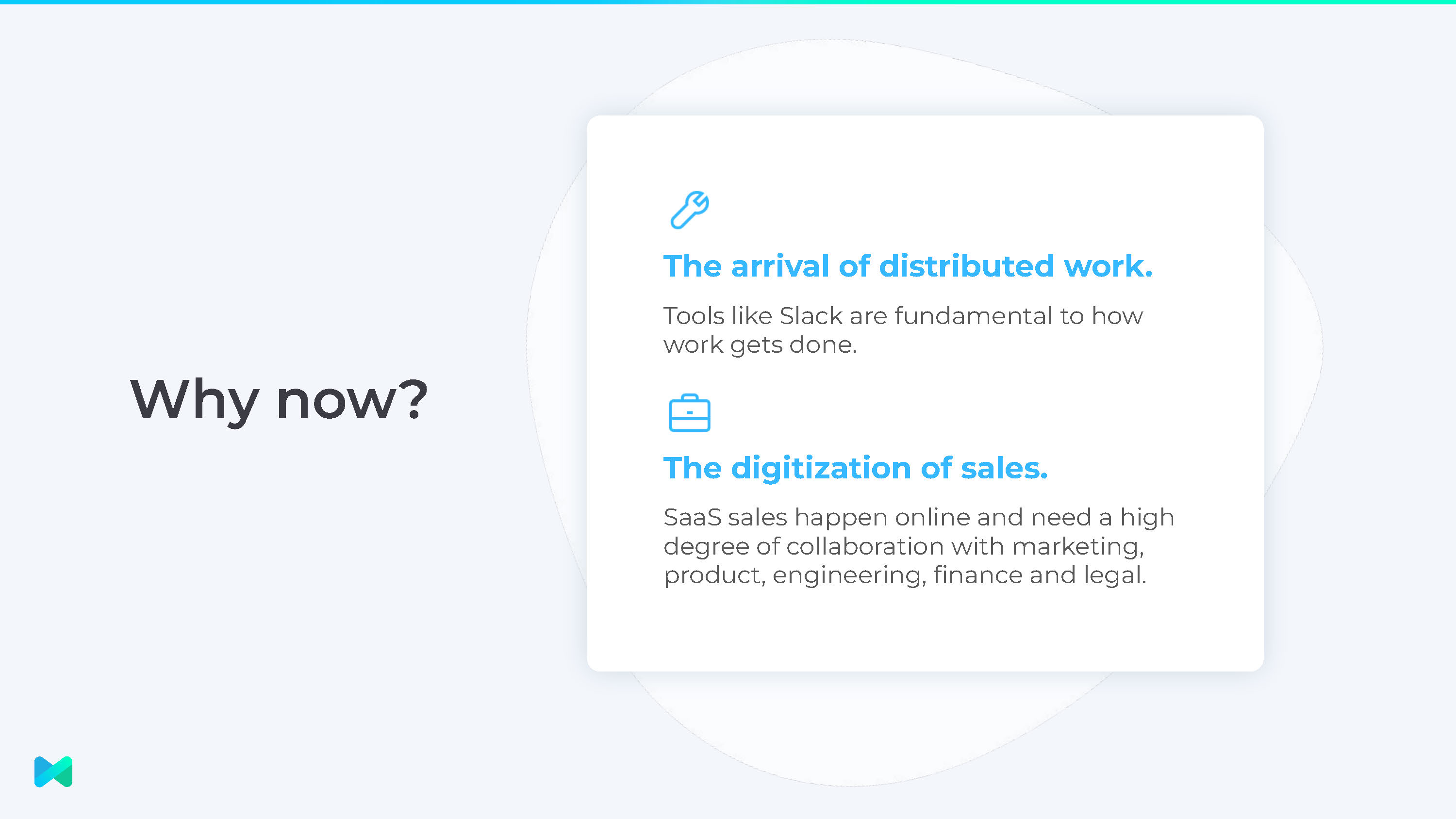
One of the big things investors will ask themselves is, “Why now?” — especially in the context of a company like Momentum. Salesforce has been around for a long time, and there are a lot of other sales tools out there. The questions that spring to mind are, “Why didn’t this happen five years ago?” and “Why can’t this be done five years from now?” Momentum’s deck answers that question beautifully, including elements of the macroeconomic landscape (“the arrival of distributed work”) and a shift in how sales are done. I particularly enjoy that the company doesn’t mention COVID-19 directly; don’t worry, the investors will be excruciatingly aware that the world has changed and that behavior shifts are likely to be permanent.
The mic drop
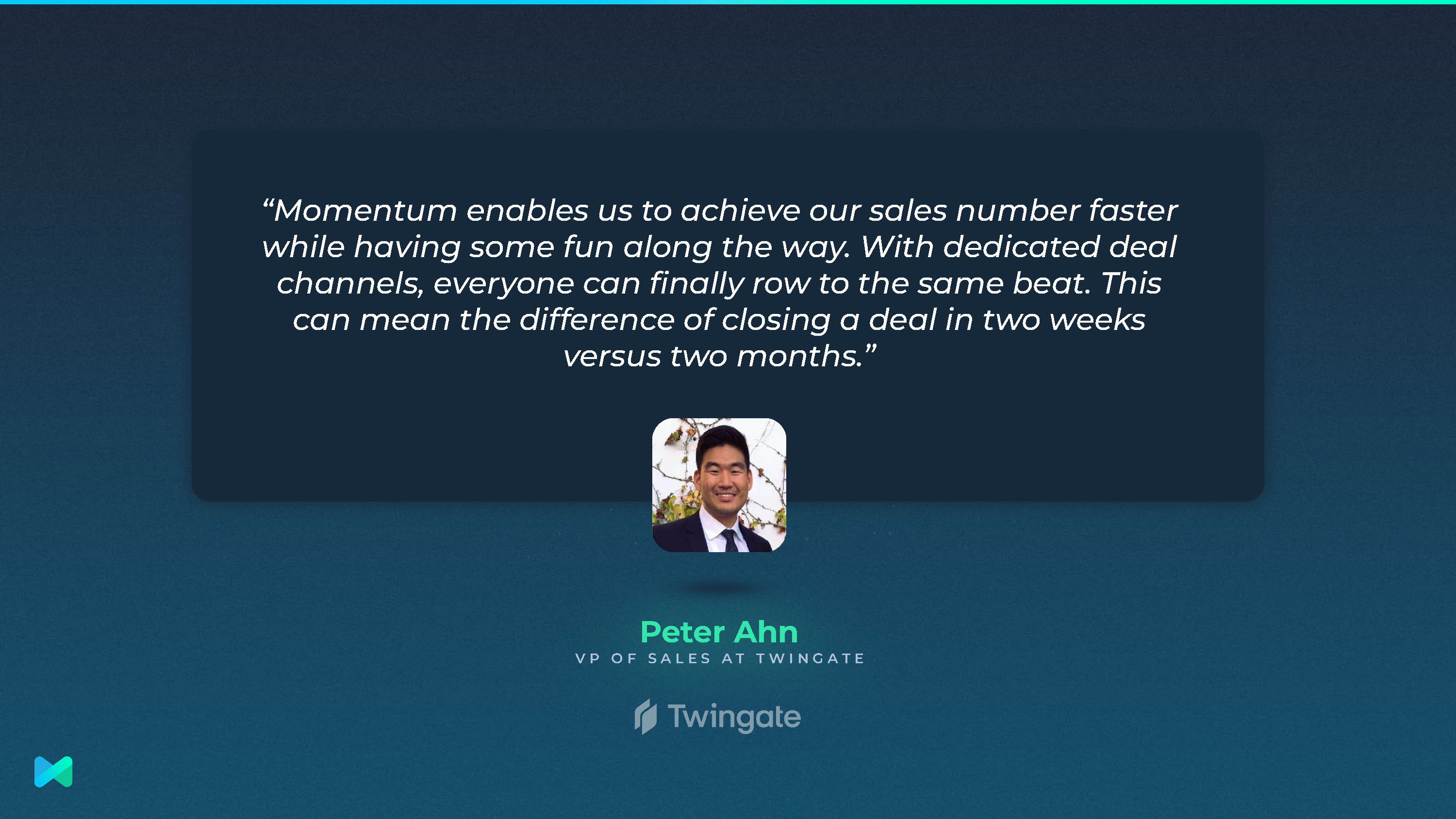
In journalism, we often use something we call the martini glass style of writing: You assume that the reader will at some point stop reading, so you put the important info at the top of the article. That’s why you often find the who, what, when, where and how early on, with the “why” taking up the bulk of the analysis of a piece. “Wait,” I hear you cry, “that sounds like a triangle, not a martini glass!” Correct — the flat stem of the glass represents a punchline, a final parting volley that helps the reader pull all the pieces together. These days, you’d call it the mic-drop moment.
That’s what Momentum does so well in this deck — the first few slides set the stage, and in the penultimate slide, the company adds a customer testimonial. That is a great idea because a lot of founders will run out of steam a little bit toward the end of the pitch. The last thing you want to do is to launch into the investor Q&A session from a place of “meh.” By bringing the conversation back to a customer testimonial, it reinforces the impact the company has on its customers. Investors know that that’s a rare and hard-to-achieve thing, so it really sets the tone for the conversation to come.
In the rest of this teardown, we’ll take a look at three things Momentum could have improved or done differently, along with its full pitch deck!
Three things that could be improved
Not gonna lie, this is my least favorite part of the Pitch Deck Teardowns; I’m used to and comfortable with giving feedback behind closed doors, but saying, “Well, I like what you did here, but here’s a few things you could improve,” in public always feels like airing dirty laundry. I am so grateful to the founders who have submitted their decks for review — I know it is a vulnerable thing to subject yourself to. OK. Let’s go:
SMARTer goals

As a startup founder, you are familiar with SMART goals (if you aren’t, Google it on the sly and don’t tell anyone you didn’t know). I love that Momentum included an “ask” slide — many startups don’t — but it fell slightly short on specifics. Now, you have to be careful about making promises (or “representations,” as the lawyers like to call it) to investors, but I feel like Momentum ended up on the far soft side of things.
“To continue building the product and track to $1M ARR” sounds good, but isn’t a measurable goal. Write one line of code and commit it to your codebase, and you’ve “continued building the product.” Make one sale and you are “tracking to $1M ARR.” I would challenge the founders to tighten those promises. What are the major product milestones you are promising to deliver in the next 18 months? What is the actual ARR goal you are projecting? By making the goals measurable, you set yourself up for potential failure, yes, but also, you’re taking a stand that you are confident in what you are building.
Break out the trumpets and blow a fanfare
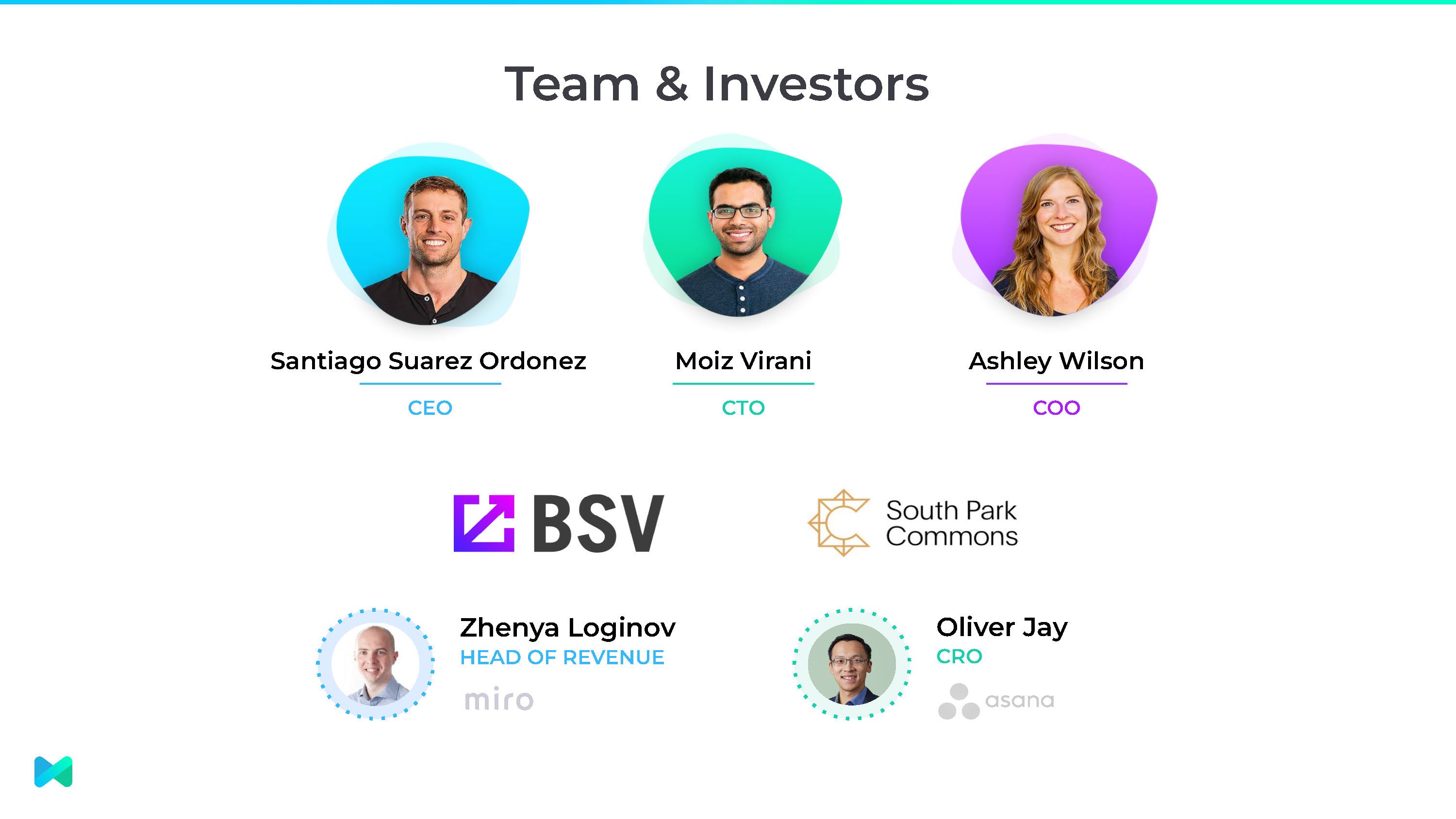
The company’s team slide is pretty lackluster. It is well designed, yes, and Santiago Suarez Ordoñez, Moiz Virani and Ashley Wilson look like wonderful humans, but the slide is weak. It doesn’t tell me that the team is part of the company’s competitive advantage, and as an investor, that would worry me.
Who are these people? What have they done before? Can I trust them with my $5 million? Clearly, the investors thought so (or they wouldn’t have invested), but this slide says almost nothing at all. I don’t know how big the overall team is. I don’t know whether these are repeat or first-time founders. I don’t know if they have 60 years of combined experience in building sales automation software or if this is their first-ever rodeo without relevant experience. Especially in the earliest stages of companies, you invest in the potential and history of the team — none of that is visible here.
Sell the solution!
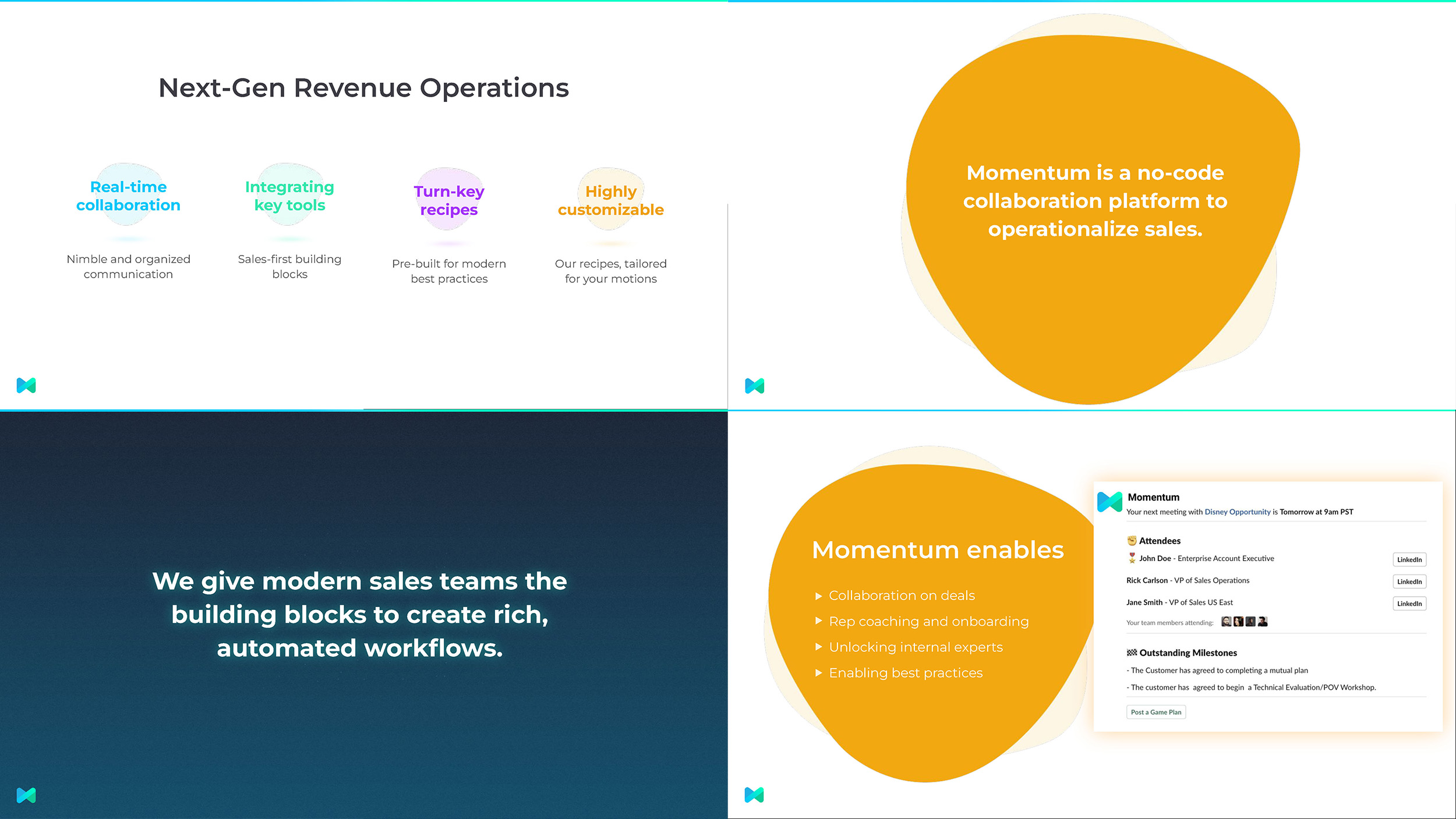
I was a little surprised to see Momentum invest four slides in talking about its product but staying relatively tactical. In other words, it feels as if the deck stays relatively surface level without going deeper into the why. In sales, my experience is people make decisions on emotions and benefits, rather than on features and logic. In other words: Nike doesn’t sell running shoes. It sells health, well-being and looking cool. People don’t give a shit about rubber and plastics and leather — they care about what the shoes enable.
In this deck, the company falls into the trap of talking about the mechanics (“no-code platform,” “rich, automated workflows,” “collaboration on deals”), and misses the opportunity to dig into the benefits. It’s not about the no-code, it’s about how easy it is to integrate. It’s not about the rich workflows, it’s about not risking things slipping between the cracks. It’s not about collaboration, it’s about closing more sales and reducing stress. In a nutshell: You’re selling a solution, not a product.
Granted, I’m being a little harsh here — and Momentum raised the money, so perhaps I’m picking nits — but I’d have loved to see the company connect a bit deeper as part of its storytelling.
Raising money without a deck
I spoke to Ordoñez, the company’s founder, for this teardown, and he told me the story of how the round came together.
“The real way it went down as we raised the pre-seed round where Basis Set ventures was a follow,” Ordoñez explained. “They came in at a $250,000 check well after we had the round secured. We immediately realized, hey, we’re a pre-seed company. They barely know us, so let’s get them involved. And we established a board meeting, and we met with them every two months, showed our progress and stayed close. We developed a real relationship with the investors.”
At some point, when Momentum was ready to raise another round, they mentioned in a board meeting that they were thinking about it.
“We showed up on a Friday board meeting. On Monday, they were like, hey, do you have five minutes? We want to sit down with you,” Ordoñez laughed, shaking his head as if he still can’t quite believe it. “They literally put a term sheet on the table with the exact terms we wanted.”
From that lead check, the company needed some additional follow-on investors, so it put together a deck and hit the road! Below is the deck it came up with.
The full pitch deck
If you want your own pitch deck teardown featured on TC+, here’s more information. Also, check out all our Pitch Deck Teardowns and other pitching advice.





























Comment